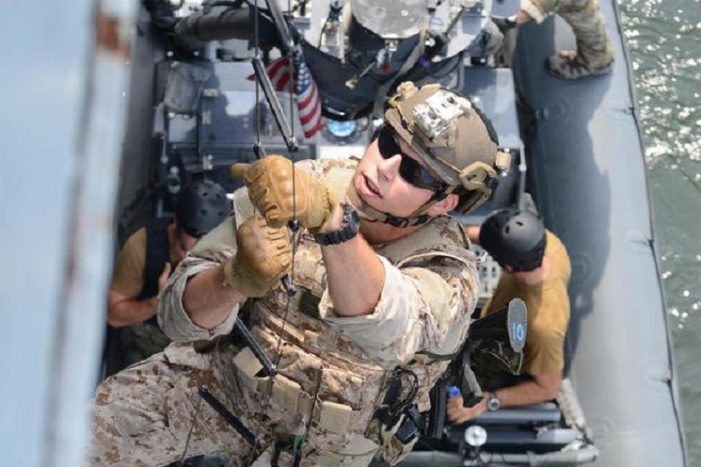U.S. Supreme Court Rules in Case on Religious Vaccine Exemptions for Deployment of Navy Seals

On Mar. 25, 2022, the U.S. Supreme Court sided with the Biden administration allowing the U.S. Navy to consider the COVID-19 vaccination status of military personnel when making deployment decisions. The 6-3 decision overrides a lower U.S. district court decision that had temporarily prevented the Navy from treating deployment of Navy Seals with religious vaccine exemptions differently from those without religious exemptions.1
In 2021, the Department of Defense (DoD) mandated that all members of the military receive the COVID vaccine by mid-December. A group of 35 Navy Seals filed a federal lawsuit claiming they faced disciplinary repercussions after they filed a religious exemption to the vaccination requirement, which they argued is a violation of the Free Exercise of Religion Clause of the U.S. Constitution and the Religious Freedom Restoration Act.
Texas Court Had Temporarily Blocked Navy from Punishing Seals with Religious Vaccine Exemptions
On Jan. 3, 2022, Judge Reed O’Connor for the Northern District of Texas Fort Worth granted a preliminary injunction blocking the Navy from declaring that Navy Seals, who had filed for a religious vaccine exemption, are non-deployable and disqualified from Special Operations and can be disciplined and discharged from the service. Judge O’Connor stated:
There is no COVID-19 exception to the First Amendment. There is no military exclusion from our Constitution.2
The U.S. Fifth Circuit Court of Appeals upheld Judge O’Connor’s injunction. This prompted the Biden administration to appeal to the U.S. Supreme Court for a review and request that the nation’s highest court partially reverse the preliminary injunction, which was granted.3 4
The Supreme Court ruling allows the Navy to consider the vaccination status of Seals when making deployment, assignment and other operational decisions while the Fifth Circuit Court of Appeals further considers the Navy’s position that military personnel filing a religious vaccine exemption should be subject to discipline and discharge from the service. The Court’s narrow decision is limited only to the Navy considering vaccination status in deciding assignments and deployments, while the temporary prohibition on disciplining or discharging Seals who file a religious exemption remains in place.5
Since the controversial COVID vaccine was mandated for the Navy, there have been approximately 4,000 requests for religious exemptions but, as of February 2022, only 80 requests have been adjudicated and only one religious vaccine exemption has been granted.6 The attorneys for the Navy Seals argue that the Navy is using the personnel assignment process as punishment for Seals, whose religious beliefs prevent them from getting the COVID vaccine. Seals applying for a religious vaccine exemption are disqualified from specialized assignments and missions, while Seals, who are not vaccinated for medical or administrative reasons, are still eligible.7
One Justice Cited the U.S. Constitution Making President Commander in Chief of Armed Forces
Justice Brett Kavanaugh, in a concurring opinion, expressed the belief that this decision should be made by the President as Commander in Chief of the armed forces as set forth in the Constitution.8 He wrote:
Under Article II of the Constitution, the President of the United States, not any federal judge, is the Commander in Chief of the Armed Forces. In light of that bedrock constitutional principle, “courts traditionally have been reluctant to intrude upon the authority of the Executive in military and national security affairs.9
Two Justices Dissent and Point To Navy’s “Shabby” Treatment of Seals
Justices Samuel Alito, Neil Gorsuch and Clarence Thomas dissented from the majority opinion. In their dissent, they stated:
By rubberstamping the Government’s request for what it calls a “partial stay,” the Court does a great injustice to the 35 respondents—Navy Seals and others in the Naval Special Warfare community—who have volunteered to under-take demanding and hazardous duties to defend our country. These individuals appear to have been treated shabbily by the Navy, and the Court brushes all that aside… the Court’s order essentially gives the Navy carte blanche to warehouse respondents for the duration of the appellate process, which may take years. There is no justification for this unexplained and potentially career-ending disposition.9
As the court case continues in the Fifth Circuit Court of Appeals, the Navy will be allowed to consider COVID vaccination status for deployment decisions.
If you would like to receive an e-mail notice of the most recent articles published in The Vaccine Reaction each week, click here.
Click here to view References:
No comments:
Post a Comment